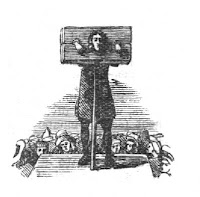APPLY FOR THIS OPPORTUNITY!
Or, know someone who would be a perfect fit? Let them know!
Share / Like / Tag a friend in a post or comment!
To complete application process efficiently and successfully, you must read the Application Instructions carefully before/during application process.
 Flirting in public. Shaving on Sunday. Complaining that a minister’s sermon was boring. Today, all of those acts sound harmless. But they were crimes in colonial America, and those who were guilty of them were publically humiliated.
Flirting in public. Shaving on Sunday. Complaining that a minister’s sermon was boring. Today, all of those acts sound harmless. But they were crimes in colonial America, and those who were guilty of them were publically humiliated.
In Massachusetts, for example, a man accused of flirting might wind up in “the stocks”—a wooden frame in the town square. The culprit’s hands and feet were stuck through holes in the frame and locked into place. Townspeople would gather to jeer at the embarrassed prisoner. Sometimes they even threw food at him.
Improper behavior on Sunday might mean time in “the pillory” pictured here. In that contraption, the criminal’s head and hands were locked into place. He stood there for hours, enduring public ridicule. In Puritan Massachusetts, it was against the law to make a bed or cook a meal on Sunday.
Drunks might be ordered to walk around town wearing long wooden barrels. And an offense as minor as nagging or scolding might lead to the “ducking stool.” A woman accused of having a nasty disposition was strapped into a chair and repeatedly immersed in water.
More serious crimes resulted in more serious punishments. The Puritans regarded hanging as a suitable punishment for 15 crimes including murder, adultery, kidnapping, and witchcraft.
How to Stop Missing Deadlines? Follow our Facebook Page and Twitter
!-Jobs, internships, scholarships, Conferences, Trainings are published every day!

